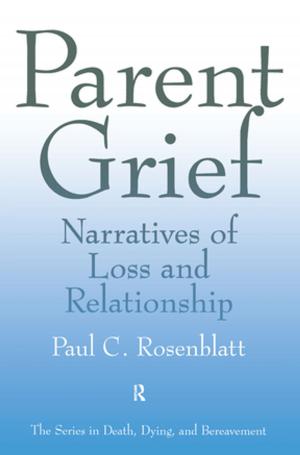Making Sense of Madness
Contesting the Meaning of Schizophrenia
Nonfiction, Health & Well Being, Psychology, Mental Illness, Mental Health| Author: | Jim Geekie, John Read | ISBN: | 9781134043361 |
| Publisher: | Taylor and Francis | Publication: | May 6, 2009 |
| Imprint: | Routledge | Language: | English |
| Author: | Jim Geekie, John Read |
| ISBN: | 9781134043361 |
| Publisher: | Taylor and Francis |
| Publication: | May 6, 2009 |
| Imprint: | Routledge |
| Language: | English |
The experience of madness – which might also be referred to more formally as ‘schizophrenia’ or ‘psychosis’ – consists of a complex, confusing and often distressing collection of experiences, such as hearing voices or developing unusual, seemingly unfounded beliefs. Madness, in its various forms and guises, seems to be a ubiquitous feature of being human, yet our ability to make sense of madness, and our knowledge of how to help those who are so troubled, is limited.
Making Sense of Madness explores the subjective experiences of madness. Using clients' stories and verbatim descriptions, it argues that the experience of 'madness' is an integral part of what it is to be human, and that greater focus on subjective experiences can contribute to professional understandings and ways of helping those who might be troubled by these experiences.
Areas of discussion include:
- how people who experience psychosis make sense of it themselves
- scientific/professional understandings of ‘madness'
- what the public thinks about ‘schizophrenia’
Making Sense of Madness will be essential reading for all mental health professionals as well as being of great interest to people who experience psychosis and their families and friends.
The experience of madness – which might also be referred to more formally as ‘schizophrenia’ or ‘psychosis’ – consists of a complex, confusing and often distressing collection of experiences, such as hearing voices or developing unusual, seemingly unfounded beliefs. Madness, in its various forms and guises, seems to be a ubiquitous feature of being human, yet our ability to make sense of madness, and our knowledge of how to help those who are so troubled, is limited.
Making Sense of Madness explores the subjective experiences of madness. Using clients' stories and verbatim descriptions, it argues that the experience of 'madness' is an integral part of what it is to be human, and that greater focus on subjective experiences can contribute to professional understandings and ways of helping those who might be troubled by these experiences.
Areas of discussion include:
- how people who experience psychosis make sense of it themselves
- scientific/professional understandings of ‘madness'
- what the public thinks about ‘schizophrenia’
Making Sense of Madness will be essential reading for all mental health professionals as well as being of great interest to people who experience psychosis and their families and friends.















